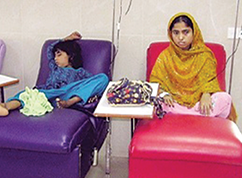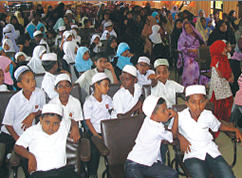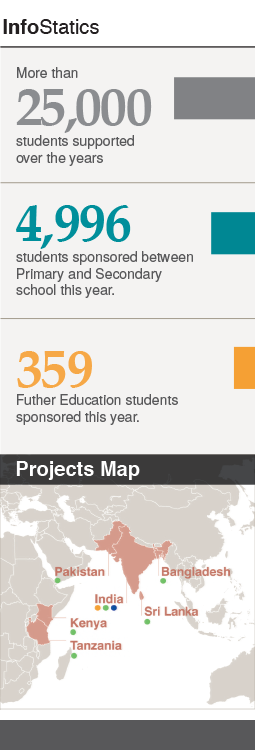Qurbani
QURBANI - AQIQA
‘Qurbani’ is Arabic for ‘sacrifice’ of an animal (usually a cow, sheep or goat) in the way of Islam where the meat is then distributed among the deserving for consumption. ‘Qurbani-Aqiqa’ is an Islamic custom observed by Muslims on the birth of a child where the hair on the head of the infant is shaved usually on the 7th day of its birth and an animal is sacrificed.
QURBANI - KAFFARA
‘Qurbani’ is Arabic for ‘sacrifice’ of an animal (usually a cow, sheep or goat) in the way of Islam whose meat is then distributed among the deserving for consumption. ‘Kaffara’ is a penalty paid for failing to carry out certain obligatory acts, or for breaking an oath, or for committing certain sins, or for harming someone. ‘Qurbani-Kaffara’ means to compensate for any of the above acts by sacrificing an animal so that its meat can be gifted to to the needy as a source of food.
QURBANI - SADQA
‘Qurbani’ is Arabic for ‘sacrifice’ of an animal (usually a cow, sheep or goat) in the way of Islam whose meat is then distributed among the deserving for consumption. ‘Sadaqa’ is Arabic for charity. 'Qurbani-Sadaqa' means to give charity by way of sacrificing an animal so that its meat can be gifted to the needy as a source of food.
QURBANI - EID-AL-HAJJ
‘Qurbani’ is Arabic for ‘sacrifice’ of an animal (usually a cow, sheep or goat) in the way of Islam whose meat is then distributed among the deserving for consumption. Eid-al-Hajj is the festival at the end of the annual pilgrimage to Makkah – called the Hajj. At this time, Muslims sacrifice an animal to replicate Prophet Abraham’s readiness to sacrifice his son Ismail, for the sake of God. On a spiritual level, this act symbolizes the human being’s willingness to give up or detach from those barriers (such as wealth, pride, arrogance) which weaken our faith and hold us back from seeking closeness to God. This is a time for people to reflect on what changes we need to make within ourselves to become better human beings.
Bilal Muslim Mission
BMMK (Bilal Muslim Misson Kenya)
This is an external agency which we help fundraise for. For more information visit http://www.kenbilal.org/
BMMT (Bilal Muslim Misson Tanzania)
This is an external agency which we help fundraise for. For more information visit http://www.bilaltz.org/
Khums
Khums
Khums is a religious tax, equivalent to one-fifth of one’s ‘taxable income’. This ‘taxable income’ is the amount of one year’s savings (after deducting all legitimate expenses from the earnings of that year). Khums is divided into two equal parts where one half is paid as ‘Sehme Imam’ and the other half is ‘Sehme Sadaat’.
Khums (Sehme Imam)
Khums is a religious tax that is divided into two equal parts where one half is paid as ‘Sehme Imam’ and the other half is ‘Sehme Sadaat’. Sehme Imam is the half that is given to the Imam (spiritual leader) of the time and should be paid to his representative (Mujtahed) that will act like an agency using this for charity and religious and social causes.
Nice to Know:
Definition of an ‘Imam’ by Imam Musa al-Kazim (as): "Imam is the heir of a person who has no heir, and he is the provider of a person who has no provider." - Muhammad b. Ya`qub al- Kulayni, al-Usulu 'l-Kafi, vol. 1 (Tehran: Daru 'l-Kutubi 'l-Islamiyya, 1388 AH) p. 542.
Khums (Sehme Sadaat)
Khums is a religious tax, equivalent to one-fifth of one’s ‘taxable income’. This ‘taxable income’ is the amount of one year’s savings (after deducting all legitimate expenses from the earnings of that year). Khums is divided into two equal parts where one half is paid as ‘Sehme Imam’ and the other half is ‘Sehme Sadaat’.
Genreral Fund
GENERAL FUND
This fund will give us flexibility and allow us to use funds where needed most.
FOUNDATION FUND
The Mulla Asghar Foundation Fund of The World Federation is used for investments, the returns from which, in time, will enable the organization to meet its administrative costs without levying any admin charge on donations received. The aim is that in the future, the entire donations from our donors may go towards charity.
Welfare Fund
WIDOWS / ORPHANS
This fund is specific to this group of deserving people.
POOR
This fund is specific to this group of deserving people.
SADAQA
‘Sadaqa’ is Arabic for charity or alms to be paid to anyone who is needy and deserving. The descendants of Prophet Muhammad (s) are prohibited from receiving this charity.
NAZR (IMAM ZAMIN, ETC)
‘Nazr’ means to make a spiritual vow to God where if He grants you a specified wish, then you will fulfill your (specified) pledge to Him. Making a Nazr (vow) makes it obligatory upon oneself to do some good act, or to refrain from doing an act which is better not to do, for the sake of, or for the pleasure of God. Once a spiritual vow is taken by a Muslim, it becomes obligatory on him/her to fulfill the vow if his/her wish is granted by God. Nazr is one of many means by which a human being seeks the assistance of God.
Huqooq
QADHAA' NAMAZ
‘Qadhaa Namaaz’ means lapsed prayer. When Muslims reach puberty (buloogh), it becomes obligatory upon them to perform prayers (namaaz) 5 times a day. When any of the 5 daily prayers are missed, it is expected that the individual will make them up during his/her lifetime.
This is a debt upon the person owing to God. As long as the person is alive, no other person can offer the Qadhaa Namaat on his/her behalf. However, in the event that an individual dies, someone else can offer any lapsed prayers on their behalf. The World Federation arranges to have lapsed obligatory prayers recited on behalf of a deceased person. Please include the name(s) of the deceased person(s) the Qadhaa namaaz to be performed for in the field provided. You can also email us the names seperately to [email protected]
(Qaza Namaz GBP 150/USD 250 [one year]. Because of currency fluctuations, there might be a small residue amount left over from what you have paid and we would like to with your permission use this amount towards other good causes. There will be no liability on your part where the amount becomes insufficient due currency exchange rates.)
QADHAA' ROZA
‘Qadhaa Roza’ means lapsed fast. When Muslims reach puberty (buloogh), it becomes obligatory on them to fast during the month of Ramadhan. In the event that he/she missed a fast, then depending on the reason, he/she is expected to make up the missed fast by fasting after the month of Ramadhan.
This is a debt of a person owing to God. As long as a person is alive, no other person can fast the Qadhaa Roza on his/her behalf. However, in the event that an individual dies, someone else can fast any lapsed fasts on their behalf. The World Federation arranges to have lapsed fasts carried out on behalf of a deceased person. Please include the name(s) of the deceased person(s) the Qadhaa fast to be performed for in the field provided. You can also email us the names seperately to [email protected]
(Qaza Roza GBP 100/USD 165 [one month]. Because of currency fluctuations, there might be a small residue amount left over from what you have paid and we would like to with your permission use this amount towards other good causes. There will be no liability on your part where the amount becomes insufficient due currency exchange rates.)
Fidya/Kaffara
Fidya/Kaffara
‘Fidya’ meaning compensation, is when someone is not able to fast in Ramadan and cannot make them up afterwards (due to illness etc.) they pay for someone else to be fed. For example, Fidya is payable when a person misses a fast due to legitimate reasons and then cannot fulfil its qadha.
(For those unable to repay their Rozas before the Ramadhan of the following year, Fidya is GBP 1.50 (USD 2.50) per Roza.)
‘Kaffara’ in Arbaic literally means ‘to remove’ or ‘blot out’ something. In religious law it is a atonement or penitence for failing to carry out certain obligatory acts, or for breaking an oath, or for committing certain sins, or for harming someone. For example, kaffarah becomes payable, as well as the Qadha of that fast, for intentionally missing a fast(s) without a valid excuse.
(The rate of Kaffara of a Roza is GBP 90 (USD 150) per Roza. For other intentional acts or complicated cases please contact us or your Mara’je (Scholar) for the calculations)
Zakat
ZAKAT
Zakat (meaning ‘that which purifies’ in Arabic) is a poor tax that is paid annually at the rate of one fortieth of the value of one’s capital possessions such as gold and silver coins, wheat, barley, dates, raisins, camels, cattle, goat and sheep, after satisfying certain conditions.
Nice to Know: Imam as-sadiq (a.s) says: If all the people were to pay the zakat of their wealth, not a single Muslim would be left indigent and needy. People do not turn needy, destitute, hungry and bare except due to the transgressions of the affluent ones! Ibid., vol. 6, pg. 4 (Chapter 1 of the Chapters of Zakat, no. 6)
ZAKAT AL-FITRAH
‘Zakāt al-Fitrah’ is a religious tax paid on the day when Muslims break the fasting period at the end of the month of Ramadhān. According to ruling number 1181 of Minhaj al-saliheen of Sayyid Sistani, “It is permissible to pay zakat al-Fitrah in the month of Ramadan, although the recommended precaution is that it should be paid as a loan and then considered as zakat al- fitrah when the time arrives (night of Eid).”
Radde Mazalim
RADDE MAZALIM
Radde Mazalim means ‘atonement of rights’ – to correct and compensate for violating the monetary and non-monetary rights of others. Radde Mazalim is also used to pay off any debts that one may have forgotten about or overlooked and cannot locate the person/organization to whom a debt is due (creditor).








